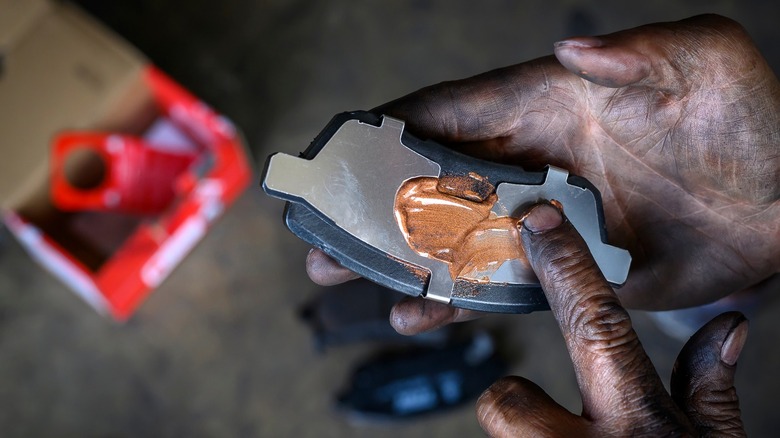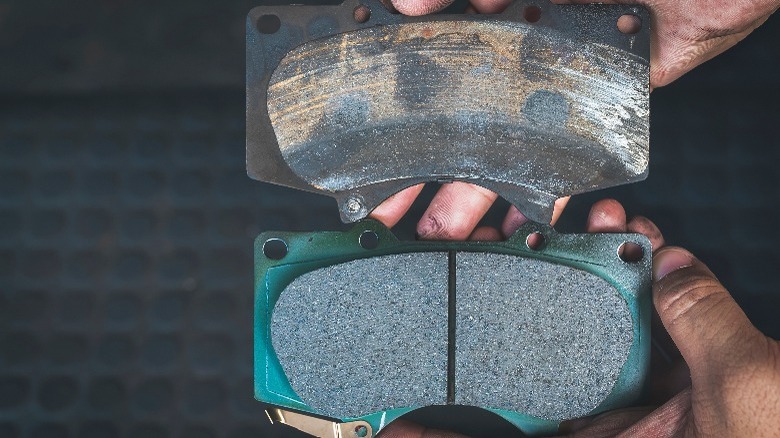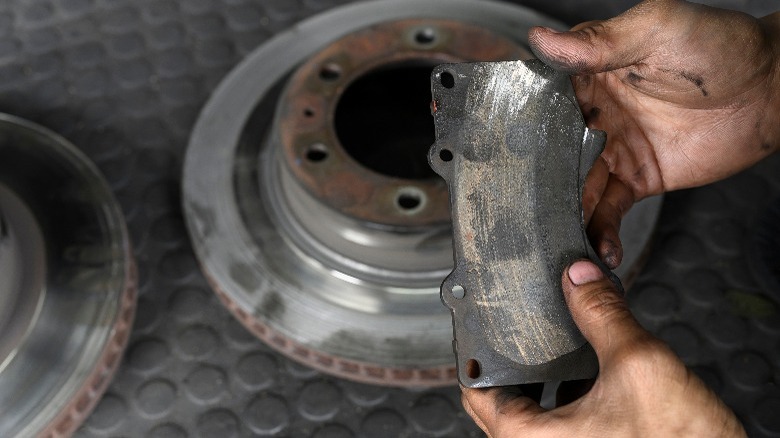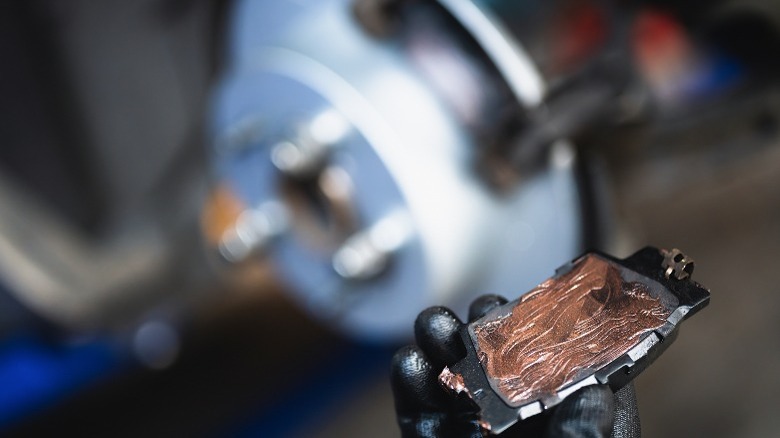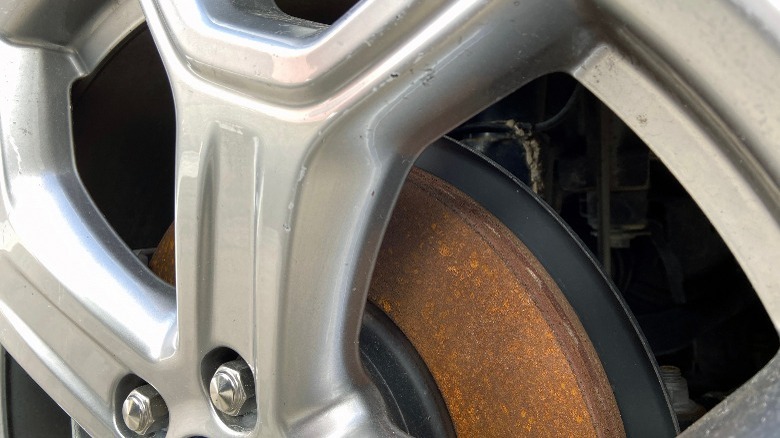4 Reasons Your Car's Brakes Are Squealing And How To Stop It
If you're unfamiliar with cars, you might think squealing brakes are a normal part of your aging vehicle. Maybe with some WD-40, or if you left the car alone for a day or two, the noisy, annoying brake sound might stop. While some variable circumstances like humidity and weather may cause squealing, most of the reasons why they're so noisy are factors you must address if you want the sound to stop.
As for those who just changed their brakes and still notice it squealing, the tips here don't apply to you. Your brakes need to settle in because they are still new. Keep driving with them, and don't worry. When the brand-new layer wears off, the sound should stop. However, if the sound happens with aged brakes, you might want to consult the tips below.
Continuous brake squealing could signal that your brake pads are worn out or that there's debris caught between the pad and the rotor. Inspecting these components is crucial, as ignoring the issue can lead to more severe damage, not just to the brakes but to the vehicle's overall safety. Regular maintenance checks can prevent these issues from escalating, ensuring your car remains safe and sound on the road.
Your brake pads are worn
With each use, the material on your brake pads wears away, similar to using an eraser on a piece of paper. Brakes work by clamping the brake pads on your wheel rotors, and the friction material will rub against the rotors in an effort to stop the car. The friction from this process causes the vehicle to stop.
When engineers design brake pads for vehicles, they know that many people wouldn't understand how brake pads wear. Apart from that, they know that most drivers will consider it an inconvenience to monitor the friction material on their brake pads by removing their tires and looking at the brakes. So, what they do is install a metal wear indicator on the brake pad that makes a loud screeching noise when it contacts the rotor. Hearing this loud squeal from your brakes means that your brake pads have about 15% or less life left, and you should change them as soon as possible. There are other signs that your brakes need replacing, but this is by far the most reliable across car models.
While changing your brake pads, bear in mind that the front pads wear faster than the back. The brake pads in front take most of the brunt and weight of the vehicle while braking. So, you might not need to change all four. Now that you know, maybe it will even encourage you to learn to change your brake pads yourself.
You're using low-quality brake pads
The problem of noise coming from low-quality brake pads is two-faced. On the one hand, using cheap brake pads means that they won't come with new retaining clips, which means you won't replace the clips, and that csn cause the noise in your brakes since retaining clips helps reduce vibration. The second problem is that cheap brake pads may be poorly designed, with uneven brake pad material.
When you have uneven brake pad material, it means it will contact the rotors unevenly and wear it out unevenly (also known as warping). By itself, warped rotors squeak, but warping can cause "gaps" between the rotor and brake pads that dirt and debris can latch on to and contribute to all the noise you hear when you apply the brakes on your car.
Additionally, low-quality brake pads often lack the advanced engineering and materials found in higher-quality options, which can lead to faster deterioration and compromised performance under stress. High temperatures generated during braking can cause inferior brake pads to break down more quickly, decreasing braking efficiency and increasing stopping distances. This contributes to the noise and uneven wear issues and poses a significant safety risk. Cheap brake pads will surely increase how often you need to replace brake pads, meaning you're more likely to hear those wear indicators quickly.
There's poor lubrication in your brake system
People often forget when changing brake pads that the brake calipers and their surroundings house moving parts that must be well-oiled for them to function properly. We aren't saying you should spray an all-purpose lubricant like WD-40 on your brakes and rotors. Instead, we are referring to specific lubricants designed for brakes, which must be applied in a certain way. Oiling these components will help them move better and reduce the squealing noise you're hearing.
Generally, the parts of the brakes that need oiling are the caliper slides, pins, bushings, and the part of the caliper that meets the brake pad — do not put any lubricant on the side of the brake pad that contacts the rotor. However, you should consult your car's manual to figure out important details, like what type of lube is best for your brakes and how to go about this.
Poor lubrication could mean that your calipers get stuck, forcing your brake pads to stay in perpetual contact with your rotors. Not only will this wear your brakes out faster, but it can cause noise even when you're not using your brakes at all. Keep all the other parts oiled to reduce vibrations and the probability of hearing a screeching rust-like noise when engaging your brakes.
There's some moisture on your brakes
Do you notice your brakes squeal every morning when you leave the driveway, but the sound stops shortly after? This is completely normal, and it happens because of condensation. The moisture that builds up when you leave your car parked outside can lead to rust and corrosion on the brake rotors.
When the vehicle is parked, especially outdoors in humid or wet conditions, a thin layer of rust can form on the rotor surface. The next time the brakes are applied, the brake pads scrape against the rust, causing a squealing noise. This is more common in the morning due to condensation that forms overnight or after rain. Although the rust layer might be removed after a few brake applications, during the time it exists, it can cause squealing noises. The best way to stop this is to park your car in a garage, or somewhere it won't be exposed to the elements.
